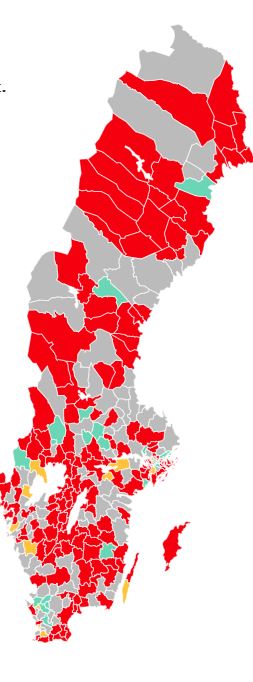
pic: https://www.dn.se/nyheter/politik/fyra-av-fem-kommuner-tvingas-skara-ner/
Things are not looking good on the municipality front. The results from Dagens Nyheter’s municipality survey is just in – 4 out of 5 municipalities will be cutting some services in the coming year (DN.se/municipalities). Meanwhile, one would be hard-pressed to find a political party that didn’t swear on every bible in 20 counties that they weren’t supportive of the local communities every waking moment. Something isn’t adding up.
When talking about cutting services, it generally means elder services, social services and schools. To that end, or rather to try and prevent that end, the government and their supporting Center and Liberal parties have promised 5 billion kronor during the rest of their term in office. (Just for fun, you can compare the 5 billion kronor they are promising with the 90 billion kronor Minister of Finance Magdalena Andersson says is needed by 2026.)
According to Helsingborg municipality, “the working population is just not paying enough taxes to cover the costs of taking care of both the young and the old – and the government isn’t helping bridge the gap.” So far, Helsingborg says, they’re not going to raise the municipal tax – but every tenth municipality, of the 197 municipalities that answered, says that they are. (There are a total of 270 municipalities in Sweden.)
According to questionnaire results, the top reasons for the deficit are:
- costs are rising faster than income
- demographic changes
- high costs
- less income
The most common expense they were planning on reducing was:
- everything (all verksamhet)
- unspecified (ospecifierad)
- care and services (vård och omsorg)
- schools

The overwhelming majority wrote in “everything” to DN’s question, which one can’t help but read in as a certain degree of hopelessness. Some municipalities have been running a deficit for many years, despite good times in other parts of the country. DN notes that saving on schools is particularly troublesome because school is not just a right but an obligation – if your kid isn’t attending school you’re actually breaking the law. Not providing for schools is therefore, in a sense, breaking contract (DN.se/contract). On the other hand, it’s hard to find a tax that doesn’t imply that the government is obliged to deliver something in return, be that hospitals, roads, defense, infrastructure, etc. It’s why we pay taxes.
While the government pays homage to the municipalities – without actually paying – the countdown to the presentation of the budget – this November – is already ticking. Perhaps this latest survey will be a kick in some direction, either a declaration of massive funding – or a declaration of “No, sorry, we can’t keep this up”. More likely, however, there will be many words of little substance. This survey, while fresh, is still, sadly, old news.
